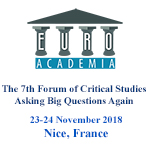Euroacademia Conferences
 Europe Inside-Out: Europe and Europeanness Exposed to Plural Observers (9th Edition) April 24 - 25, 2020
Europe Inside-Out: Europe and Europeanness Exposed to Plural Observers (9th Edition) April 24 - 25, 2020 Identities and Identifications: Politicized Uses of Collective Identities (9th Edition) June 12 - 13, 2020
Identities and Identifications: Politicized Uses of Collective Identities (9th Edition) June 12 - 13, 2020 8th Forum of Critical Studies: Asking Big Questions Again January 24 - 25, 2020
8th Forum of Critical Studies: Asking Big Questions Again January 24 - 25, 2020 Re-Inventing Eastern Europe (7th Edition) December 13 - 14, 2019
Re-Inventing Eastern Europe (7th Edition) December 13 - 14, 2019 The European Union and the Politicization of Europe (8th Edition) October 25 - 26, 2019
The European Union and the Politicization of Europe (8th Edition) October 25 - 26, 2019 Identities and Identifications: Politicized Uses of Collective Identities (8th Edition) June 28 - 29, 2019
Identities and Identifications: Politicized Uses of Collective Identities (8th Edition) June 28 - 29, 2019 The European Union and the Politicization of Europe (7th Edition) January 25 - 26, 2019
The European Union and the Politicization of Europe (7th Edition) January 25 - 26, 2019 7th Forum of Critical Studies: Asking Big Questions Again November 23 - 24, 2018
7th Forum of Critical Studies: Asking Big Questions Again November 23 - 24, 2018 Europe Inside-Out: Europe and Europeanness Exposed to Plural Observers (8th Edition) September 28 - 30, 2018
Europe Inside-Out: Europe and Europeanness Exposed to Plural Observers (8th Edition) September 28 - 30, 2018 Identities and Identifications: Politicized Uses of Collective Identities (7th Edition) June 14 - 15, 2018
Identities and Identifications: Politicized Uses of Collective Identities (7th Edition) June 14 - 15, 2018
Post-Communist Urban Identity Hunt: Myths and Landscape Narrations of Łódź, Poland
-
-

-
Presentation speakers
- Mariusz Czepczyński, Gdańsk University, Poland
Abstract:
Political and economic transformations are always followed by relevant landscapes and identities. Process of de- and re-construction of urban spaces has been enhanced and facilitated by its narrative discourses. Urban identity is constructed by various texts inscribed into landscape on social, economic and, above all, semiotic spheres of urban activities. Stories, novels, films, books, inscriptions and papers, build the immaterial meaning of the material landscape; construct the significant urban semiosphere, fundamental for local identity construction. Łódź, populated by c. 700,000 is an important regional centre located in central Poland. The city arose in the 19th century as a dynamic textile industry agglomeration, and after the WW2 new identity was built upon the urban labour and revolutionary traditions. After the fall of the state communism in 1989, the socialist past and its stories had been by and large forgotten and disappeared from the public discourse. The notion of a nineteenth century multicultural ‘Golden Age’ of the city rose as a major identity formation. The most recent identity turn is based on a future oriented interpretation of the past, related to young culture and creative industries, incorporating number of the communist era cultural achievements, while the bourgeois heritage myths are being somehow marginalised. The research is based on the analysis of a variety of media products, from the communist era, the early 1990s and most recent as part of attempts to create a new identity for the city, produced by a range of actors concerned with the economic, political and socio-cultural transformation of the city over that period.
-
Related Presentations

'Tell All The Truth But Tell It Slant': Recovering Angela Davis’ presence in Robert Barry’s Marcuse Piece
- Sandrine Canac













